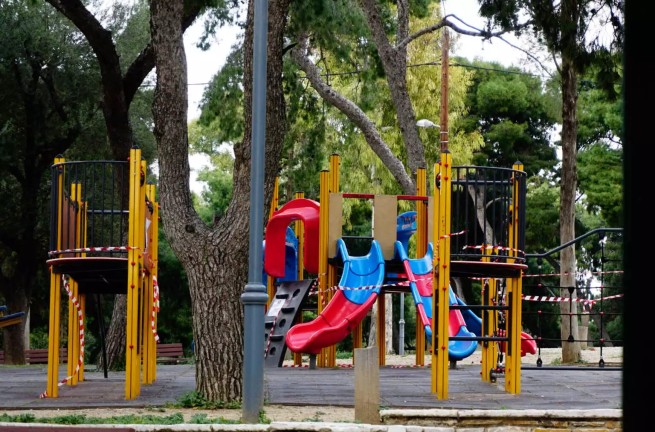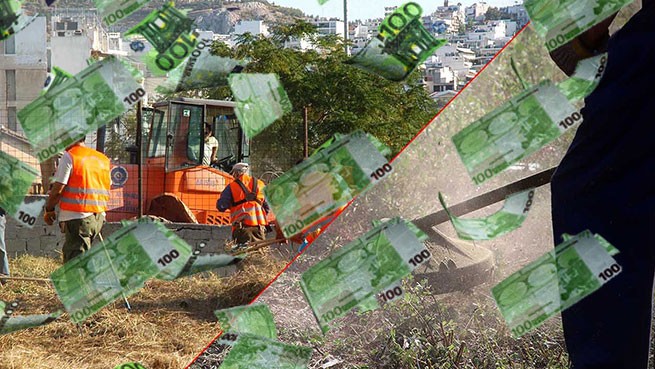The government's law on fire protection of real estate has created serious problems in the country and especially for citizens, who will have to pay out of their own pockets with money they do not have, as well as with the removal of huge amounts of dead wood resulting from the cleanups.
Even half of the owners of the plots have not “cleaned up” their territory, and municipalities are not able to do this, and if they do, it is for very substantial money. Many of those who rushed to restore order on their plots were unable to remove dry grass and branches from them, which act as fuel in the event of a fire, and the services were unable to cope with it in time. Because cleaning requires… money, and a lot of it.
The closure of the Fili landfill for two days last week due to extreme heat has exacerbated the problem, especially for municipalities that do not have their own waste disposal systems (such as composting). The extension of the deadline until June 30 does not allow municipalities to intervene on their own initiative in the situation with private property until this time.
However, some municipalities have already begun to clean up the lands of those who show indifference, imposing appropriate fines on the owners. And this, of course, raises questions, since, according to the law, no fine can be imposed before June 30! According to the law, those who clean up will have to remove dead wood and dry grass either with the help of a private company or by contacting the relevant municipality for services to remove them for an appropriate fee, which is not small at all.
There are many who pile dead wood at night in neighboring areas and open areas where there are “informal” agreements with the municipality regarding waste collection. In a conversation with the Republic newspaper, the mayor of Vari-Voulia-Vouliagmeni and first vice-president of KEDE, Grigoris Constantellos, said that there are many who do not clean their plots, and in many cases those who clean throw dead wood either in a neighboring field or in places where there are no houses: “A very large amount of cut branches and dead grass has accumulated in the municipalities. For the last 15 days, our municipal crews have been walking evening routes and working two shifts on weekends to remove dead wood from the city as quickly as possible.”he emphasized.
He noted that although the volume collected was three times more than this time last year, indicating that more people had mobilized, many owners had not yet responded.
“The issue is very confusing. We are looking for them through the Land Registry or TAP to inform them. But this is essentially a witch hunt,” the first vice-president of KEDE told us. He noted that the public funds received by the municipality for fire protection barely exceed 100,000 euros, while the total annual expenditure reaches 1,100,000 euros.
Konstantellos added that overall prevention planning is moving in the wrong direction because the focus has been on clearing land within cities when it should be focusing on clearing and thinning forests.
Kifissia Mayor Vassilis Xipolitas describes much the same picture, saying that many owners clean up their properties but don't bother removing dead trees, leaving them on sidewalks or other places. He also noted that municipal sites have been cleared, but private ones have not, with some of them being potential fire spots in urban areas. “We have cleared a total of 3,000 plots of land in the municipality. Our teams are already going to private areas and clearing them, fining the owners 400-500 euros. Soon end of June. If we don't get down to cleaning, July will come and the most fire-dangerous month is August, and we won't finish cleaning. We can't risk it”Mr. Xypolitas explained.
PS From a logical point of view, the law is correct and necessary. However, as often happens in Greece (and not only), “it was smooth on paper, but they forgot about the ravines,” its implementation turned out to be very difficult. And the fines imposed by the authorities for non-compliance with the law look like the authorities’ desire to siphon more money from property owners.
It is also no secret that the cost of clearing 1 hectare of dead wood in some areas has already exceeded 500 euros. And such work in municipalities (such as especially grain work) is under the personal control of the mayor or his inner circle. As a result, corruption flourishes, and property owners who, due to their financial condition, cannot pay for such work, become debtors to the state with the ensuing consequences…







More Stories
British Foreign Office: permission to strike Russia with Western weapons could be given before the start of winter
WSJ: Newest nuclear submarine sank in China (video)
G. Floridis: "13 year old Greek hacker "hacked" codes and penetrated all ministries – the Israelis turned to him"